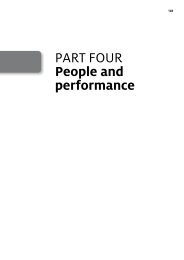The growing business handbook : inspiration and advice ... - Sparkler
The growing business handbook : inspiration and advice ... - Sparkler
The growing business handbook : inspiration and advice ... - Sparkler
Create successful ePaper yourself
Turn your PDF publications into a flip-book with our unique Google optimized e-Paper software.
233<br />
Licensing<br />
9.3<br />
In finding the best route to market, licensing can be a powerful tool. Tony<br />
R<strong>and</strong>el, a consultant at Animus <strong>and</strong> an advisor to the Intellectual Property<br />
Office, explains how it works<br />
When you mention ‘licensing’ to most people in the UK they immediately think<br />
of pub opening hours or a vehicle tax disc. Not so in most other industrialized<br />
countries; they think of the commercial implications of the word. As the UK economy<br />
becomes based more <strong>and</strong> more on our creative <strong>and</strong> inventive skills, as opposed to our<br />
traditional strengths, it is vital that all UK <strong>business</strong>es look for new, imaginative <strong>and</strong><br />
innovative <strong>business</strong> tools that they can all use to grow, find new or faster routes to<br />
market <strong>and</strong> gain competitive advantage. Licensing is just such a tool.<br />
Lots of <strong>business</strong>es are conservative in their <strong>business</strong> model <strong>and</strong> apprehensive of<br />
doing anything outside their ‘comfort zone’. ‘We have always done it this way <strong>and</strong><br />
we know it works’ is a common cry; but might it not work better if they tried<br />
something innovative? Licensing, in itself, is not new but it can be a novel <strong>and</strong><br />
alternative approach for many <strong>business</strong>es to escape from their traditional comfort<br />
zone to gain competitive advantage. This is particularly so in a world where times<br />
to market are getting shorter <strong>and</strong> windows of opportunity for new product<br />
introduction are getting smaller.<br />
So what do we mean by licensing? It is best described, in this context, as ‘permission<br />
to do something that, without the licence, would be an infringement of intellectual<br />
property’. <strong>The</strong> expression ‘intellectual property’ should be construed broadly to<br />
encompass soft IP (know-how, trade secrets, unregistered designs, unregistered trade<br />
marks etc) as well as the harder actual IP Rights. Having defined what we mean by<br />
licensing let us consider for a moment some of the possible <strong>business</strong> benefits of licensing.<br />
Revenue Generation: An owner of IP may commercialize that IP itself within its<br />
own industry sector. It may then obtain additional income from that same IP by<br />
licensing it to someone else to commercialize it in a different field.<br />
Increasing Market Penetration: An owner of IP may license another <strong>business</strong> to<br />
manufacture <strong>and</strong>/or sell in territories that the owner cannot or does not want to<br />
cover.<br />
Reducing Costs: A <strong>business</strong> may ‘buy-in’ IP that has been wholly or partially<br />
developed by another to reduce its research <strong>and</strong> development costs.<br />
Saving Time: A <strong>business</strong> may get its products or services to market more quickly<br />
by acquiring a licence to use existing IP, rather than re-inventing the wheel, even if<br />
that IP has to be modified or further developed to more exactly suit the requirements<br />
of the <strong>business</strong>.








